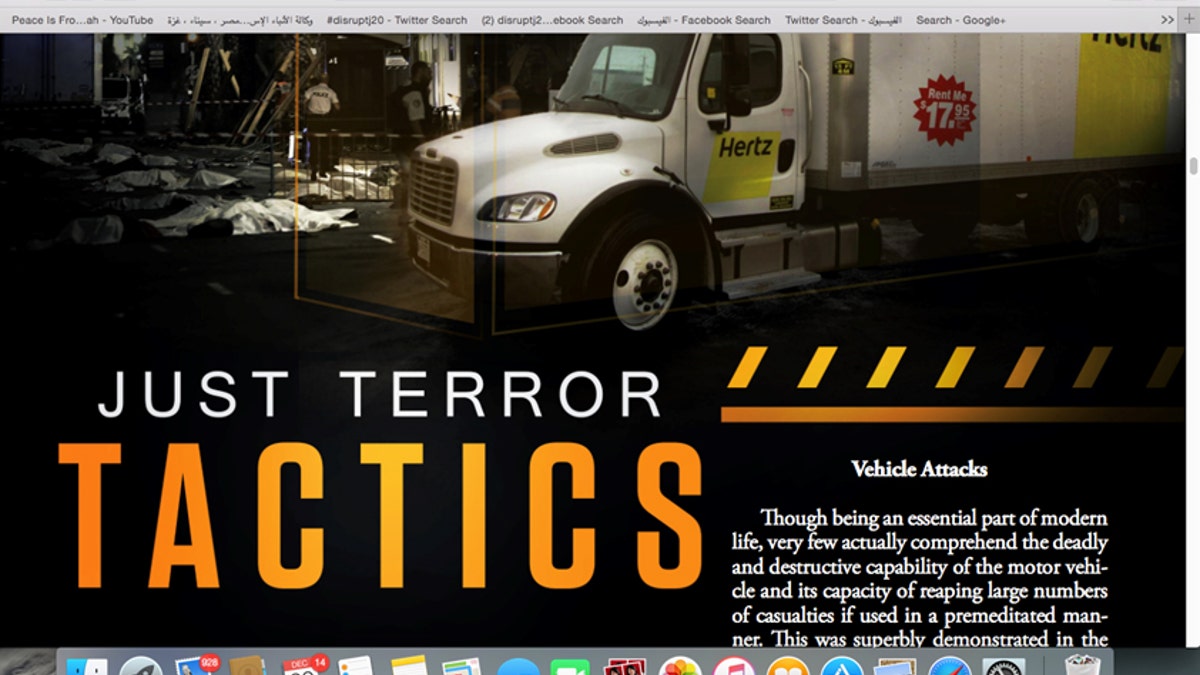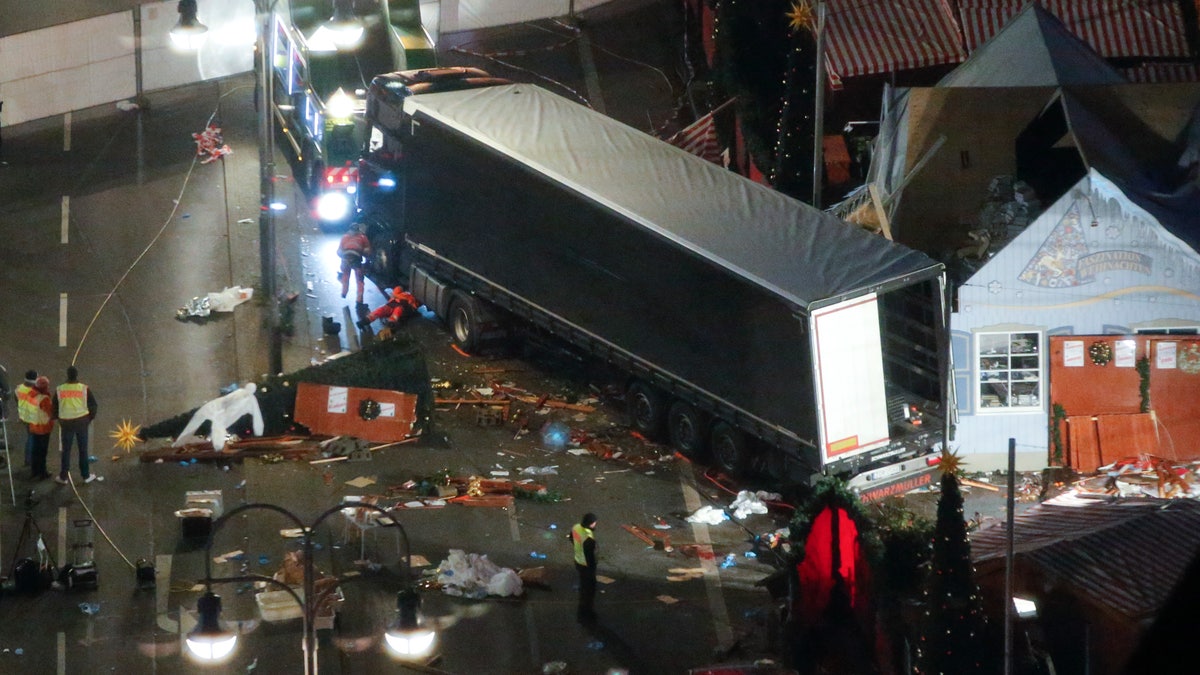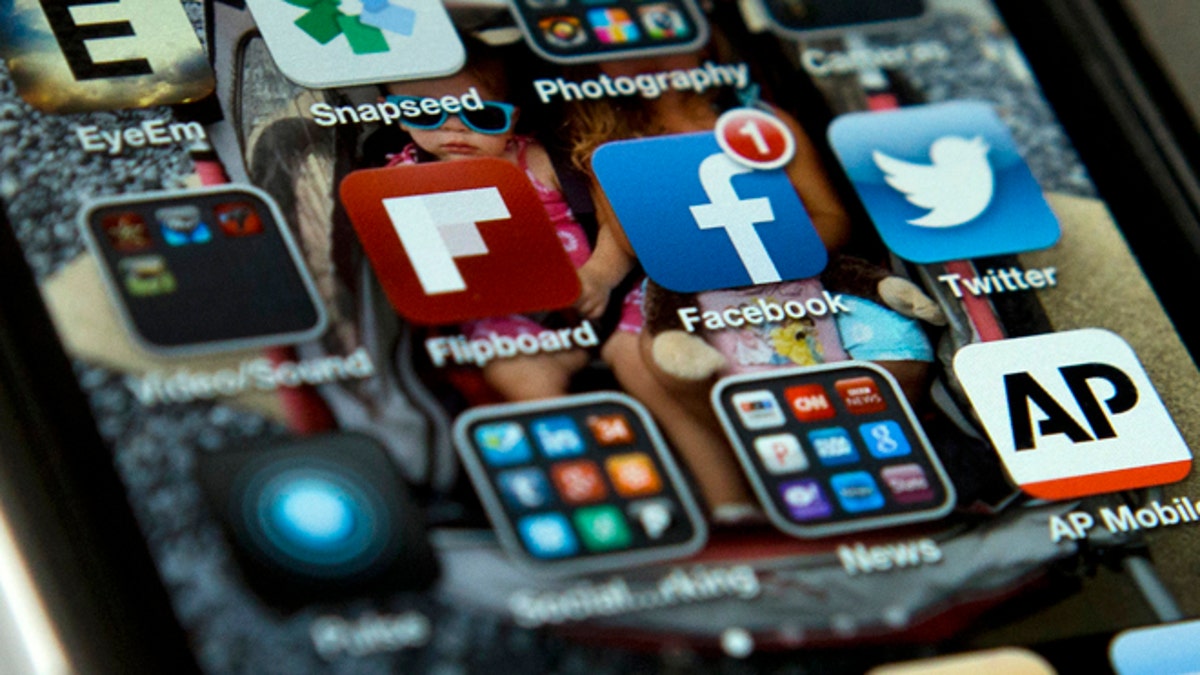More than a month before Monday's deadly terror attack at a Berlin Christmas market, social media sites tied to ISIS were flooded with links to an article in the group’s magazine touting “the deadly and destructive capability of the motor vehicle.”
In Facebook and Twitter posts dated Nov. 11 and 12, ISIS promoted the latest edition of their propaganda magazine, Rumiyah, alongside screenshots of an article entitled “Just Terror Tactics” and hashtags like Jihad, KhalifaDE and Rumiyah4.

“Though being an essential part of modern life, very few actually comprehend the deadly and destructive capability of the motor vehicle and its capacity of reaping large numbers of casualties if used in a premeditated manner,” the article in Rumiyah stated, before going on to praise Bastille Day terror attack where a Tunisian-born terrorist drove a cargo truck into a crowd of people in Nice.
The article continued: “The method of such an attack is that a vehicle is plunged at a high speed into a large congregation of kuffar (an Arabic term for “unbeliever”), smashing their bodies with the vehicle’s strong outer frame, while advancing forward – crushing their heads, torsos, and limbs under the vehicle’s wheels and chassis – and leaving behind a trail of carnage.”

A used suit of a forensic investigator lies on a Christmas tree where a truck ploughed through a crowded Christmas market killing 12 people in the west of Berlin, Germany, December 20, 2016 REUTERS/Fabrizio Bensch - RTX2VT41
Terrorism experts and social media monitors say these postings are a sign of ISIS’ expanding use of social media to recruit and radicalize followers and of the difficulties faced by both governments and private companies to properly combat accounts maintained by terror groups.
“It’s a marketing tool and a trending tool,” Eric Feinberg of the cyber security and intelligence firm GIPEC told FoxNews.com. “ISIS is a brand and they are selling their brand on social media to people who sympathize with them.”
Terror groups have used the Internet to spread their message almost since the inception of the World Wide Web, but ISIS emerged as a major presence on social media shortly after the group begin seizing major swaths of territory in Syria and Iraq back in 2014.
As a recruiting tool for foreign fighters and an outlet for the group’s messages, social media sites like Facebook and Twitter proved much more appealing and effective to ISIS than traditional websites.
“They didn’t have to build a platform. It’s all there for you, it has no cost to maintain and it has a global reach,” David Fidler, an adjunct senior fellow for cybersecurity at the Council of Foreign Relations, told FoxNews.com. “There is also a little bit of giving a sting in the tale by using this platform that was invented in the West against the West.”
Efforts by the U.S. government to combat ISIS’ social media presence have focused on a combination of military force and online counterinsurgency work. The counterinsurgency work – which includes tactics like working with social media companies to delete ISIS accounts and pushing out counter messages on these platforms – has been deemed less effective than military strikes, at least in terms of concrete gains against the terror group.
U.S. and British forces last year carried out a series of drone strikes that killed roughly a dozen members of an ISIS cell called “the Legion,” a group of computer specialists who became the megaphone for the terror group online. The FBI has arrested nearly 1,000 people in connection with the group over the last two years.
“The military has really had an impact on the effectiveness of ISIS’ social media accounts,” Fidler said. “They’re going after the underlying source rather than a symptom of the problem.”
Companies like Twitter and Facebook, experts say, are caught between a rock and hard place when it comes to the issue as they have voiced willingness to aid in the fight but have been less than transparent when it comes to sharing proprietary information like their algorithms.
The lack of transparency and the delay in taking down posts from terror groups has led to widespread criticism both in the U.S. and abroad.
“These posts were there from Nov. 11 and 12,” Feinberg said of the Rumiyah article. “What we need here is to have these things blocked….Why aren’t the same rules that apply to traditional media applied here.”
A Facebook spokesperson said the company polices accounts aggressively.

A view of an iPhone in Washington Tuesday, May 21, 2013, showing the Twitter and Facebook apps among others. A new poll finds that teens are sharing more about themselves on social media. Theyâre also moving increasingly to Twitter to avoid their parents and the "oversharing" that they see on Facebook. (AP Photo/Evan Vucci) (AP2013)
“Facebook has zero tolerance for terrorists, terror propaganda, or the praising of terror activity, and we work aggressively to remove such content from our platform as soon as we become aware of it,” the spokesperson said.
Twitter responded by forwarding a number of blog posts in which the company says it suspended 235,000 accounts between February and August of this year “for violating our policies related to promotion of terrorism.”
“[T]here is no one ‘magic algorithm’ for identifying terrorist content on the Internet,” one of Twitter’s blog posts stated. “But we continue to utilize other forms of technology, like proprietary spam-fighting tools, to supplement reports from our users and help identify repeat account abuse.”




















